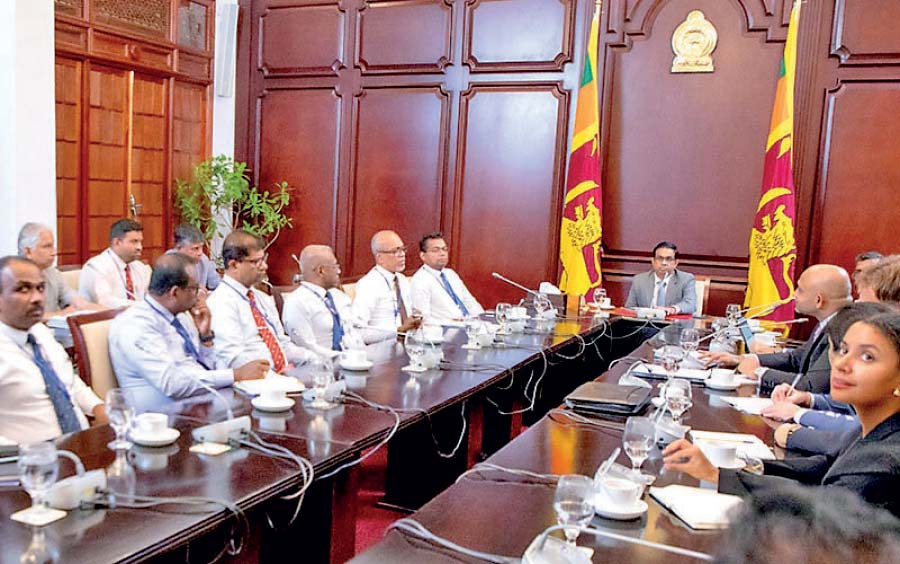Tuesday Feb 17, 2026
Tuesday Feb 17, 2026
Monday, 25 August 2025 04:25 - - {{hitsCtrl.values.hits}}

The President’s Media Division (PMD) last Friday said that initial discussions were held on the Customs Modernisation Program with World Bank representatives, a key requirement under the ongoing International Monetary Fund (IMF) bailout program and tariff negotiations with the US, where Sri Lanka has pledged to improve governance.
The discussion, chaired by Secretary to the President Dr. Nandika Sanath Kumanayake, was held on 15 August at the Presidential Secretariat. The meeting included the Revenue Administration Reform and Modernisation Bureau, established under the instructions of President Anura Kumara Disanayake to oversee the program’s implementation.
“The World Bank delegation commended the establishment of the Bureau and indicated its readiness to provide institutional support and expert guidance,” the PMD said in a statement.
Talks also covered revisions to the Customs Ordinance. The Revenue Administration Reform and Modernisation Bureau is tasked with identifying policy and strategic changes for revenue agencies, including Sri Lanka Customs, the Inland Revenue Department, and the Excise Department, and presenting recommendations to the Government.
The World Bank delegation was led by Program Leader Shabih A. Mohib. Others present included Treasury Secretary Dr. Harshana Suriyapperuma, Revenue Administration Reform and Modernisation Bureau Director W.L.C. Thilakasiri, as well as Customs officials and other representatives.
Governance and trade facilitation reforms are a key commitment in the IMF program and in ongoing negotiations to secure favourable reciprocal US tariffs, now at 20%.
According to the 2023 IMF Governance Diagnostic Assessment on Sri Lanka, “exposure to corruption in Customs and tax administration is substantial, given the absence of effective systems for performance monitoring and detecting and sanctioning officials for improper behaviour.”
It noted that the limited progress that has been made in digitising processes in tax and Customs requires users to maintain high levels of direct interaction with officials, and reduces the ability to identify integrity issues through data analytics.
Sri Lanka’s revenue departments devote limited effort and resources to promoting integrity or addressing corruption risks, according to the IMF’s Governance Diagnostic report. The Inland Revenue Department, Sri Lanka Customs, and the Excise Department operate under the Public Service Commission’s civil service framework for recruitment, promotions, and discipline, leaving little scope for measures targeted at corruption vulnerabilities.
The IMF observed that Departments set their own incentive schemes and rotation policies, some of which may undermine performance. Customs remuneration is supplemented by proceeds from seizures, while Inland Revenue runs a complex scheme that ties additional pay to revenue and operational targets. Promotions are based primarily on seniority and academic requirements, with limited weight given to merit or performance. Allegations of poor performance or integrity suspicions rarely hinder career advancement.
International practice usually involves dedicated Internal Affairs units within tax and customs agencies to investigate misconduct, but in Sri Lanka, such functions remain under Human Resources divisions. Corruption cases must be referred to the Public Service Commission, though the IMF found this happens infrequently. Customs has a Revenue Taskforce reporting to the Director-General that investigates some integrity cases, including 45 currently under review, while the Inland Revenue Department occasionally appoints ad hoc committees.
The IMF also noted that while Customs staff are expected to follow a Code of Ethics, and Inland Revenue introduced a Code of Ethics and Conduct in 2005, the latter has not been put into operation.
“Effective digitisation can reduce corruption vulnerabilities,” the IMF Governance Diagnostic report noted.
Reforms are urgent. According to a recent Institute of Policy Studies report, the 20% reciprocal tariff unilaterally imposed by the Trump administration could lead to export losses of $ 634 million and put nearly 16,000 jobs at risk, mostly female workers in the apparel industry. It pointed out that the 20% tariff rate translated to an effective rate of 29.9%, the highest since 1935, with the effective rate on apparel exports estimated as high as 36.8%.